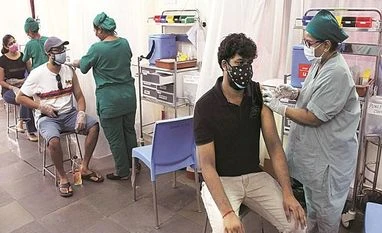The lyophilized vaccine will come in a powder form and it will be mixed with diluents before administration.
In fact, Pfizer and BioNTech have already started a phase-3 study to evaluate the lyophilized (freeze-dried) formulation of the Pfizer-BioNTech vaccine, Pfizer noted on its website.
Gennova has got permission for the phase-2 and 3 clinical trials for its lyophilized mRNA vaccine for injection — HGCO19 — from the subject expert committee advising the Central Drugs Standards Control Organisation (CDSCO), according to minutes of the meeting held on August 22.
Meanwhile, its peer Pfizer expects results from the phase-3 trials using a lyophilized vaccine later this year. “Results are anticipated in the second half of 2021. Subject to technical success, we will seek regulatory authorisation or approval,” the company said on its website.
Lyophilisation or freeze-drying is a complex process that is often used to stabilise vaccines. During the process, solvent is removed from the liquid product in manufacturing steps which include freezing, primary drying, and then secondary drying.
“The lyophilized formulation is a single-dose product prepared by filling vaccine solution into a vial, then lyophilizing or freeze-drying the contents of the vial to a powder. The vaccine is more stable in a powder form than liquid, and the lyophilized formulation is designed to be able to be shipped and stored at 2-8 °C. Prior to vaccination, the powder is reconstituted by dissolving with diluents,” Pfizer has said on its website.
"In a country like ours it is not viable to have vaccines that would require stringent temperature requirements of -70 degrees or -20 degrees to remain stable. This will make it virtually impossible to penetrate the hinterland," said someone close to the development.
mRNA vaccines typically have stringent temperature requirements to remain stable; the Pfizer-BioNTech vaccine needs -70 degrees C, while Moderna vaccine can remain stable for six months at -20 degrees C.
Suman Chakraborty, Dean, Sponsored Research and Industrial Consultancy and Innovator of the Rapid Diagnostic Technology COVIRAP, IIT Kharagpur explained: “mRNA based vaccines are new technology platforms....The key to this technology is that it is much faster than conventional vaccines. The challenge is that it requires stringent temperature requirements to remain stable as the mRNA can be easily destroyed. There are numerous enzymes that will break these apart."
However, Chakraborty adds that by modifying the building blocks of the mRNA (neucleotides) - sort of genetic modification - one can come up with modified versions that are more stable in a wider temperature range. "There are well known technologies like lipid coating etc that can help to do this stabilisation. The crucial bit is that for a specific pathogen, this recipe has to be standardised.Once this is standardised, the enzymes will break down the mRNA, but this would happen slowly." he explains.
Gennova has associated mRNA with something called lipid inorganic nanoparticle (LION) that acts as mRNA vaccine delivery system, which stabilises the mRNA and also acts as adjuvant till delivery into patients.
Vaccines typically use adjuvants to improve the immune response. Adjuvants are pharmacological or immunological agents that improve the immune response of a vaccine.
This is interesting as there are not many examples globally of lyophilized vaccines which use adjuvants.
To read the full story, Subscribe Now at just Rs 249 a month
Already a subscriber? Log in
Subscribe To BS Premium
₹249
Renews automatically
₹1699₹1999
Opt for auto renewal and save Rs. 300 Renews automatically
₹1999
What you get on BS Premium?
-
Unlock 30+ premium stories daily hand-picked by our editors, across devices on browser and app.
-
Pick your 5 favourite companies, get a daily email with all news updates on them.
Full access to our intuitive epaper - clip, save, share articles from any device; newspaper archives from 2006.
Preferential invites to Business Standard events.
Curated newsletters on markets, personal finance, policy & politics, start-ups, technology, and more.
Need More Information - write to us at assist@bsmail.in
)